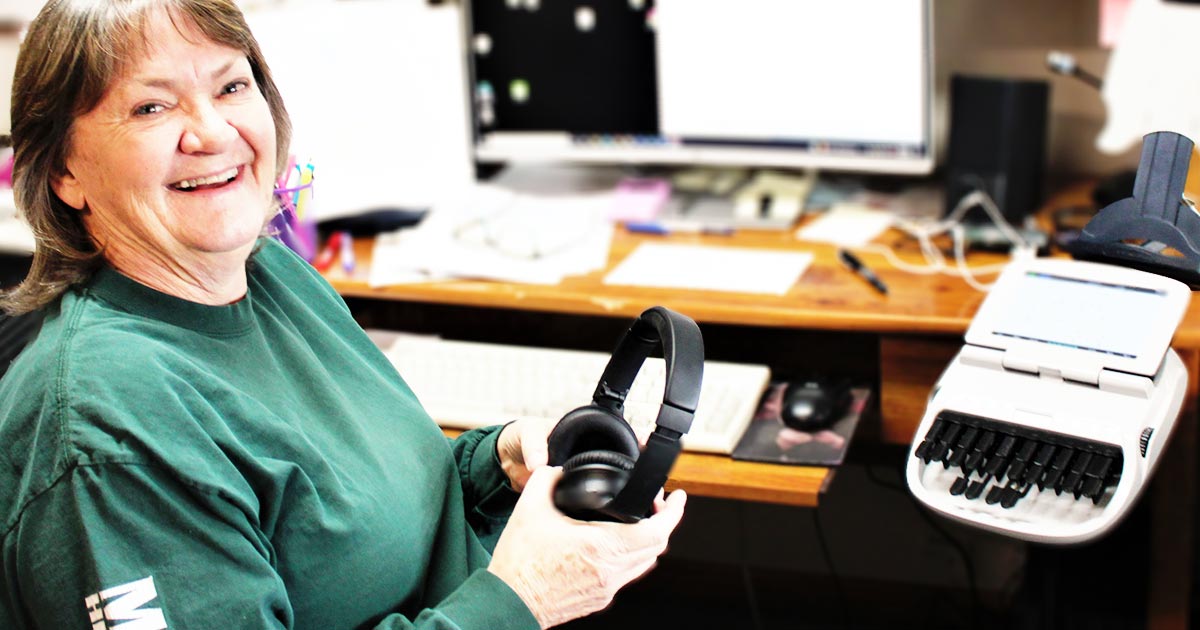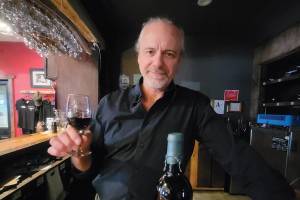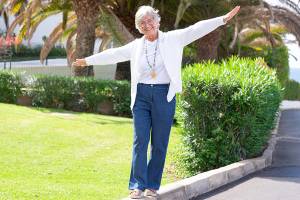By SUZANNE WARING
An uncommon skill led to an unusual occupation for Deanne MacDonald of Great Falls, Mont. Not only is her occupation unusual, but, for the last 20 years, she has worked from home, sometimes without combing her hair, while wearing pajamas and wool socks.
Over the years, Deanne has worked as a legal secretary and court reporter, but she eventually landed herself in an interesting niche working as a captioner, providing transcriptions for individuals who are deaf or hard of hearing.
Deanne grew up on a farm 25 miles north of Great Falls. She studied to be a legal secretary at the Great Falls Vo-Tech Center, but after working two years in Great Falls, she decided to attend self-paced classes at the Denver Academy of Court Reporting, graduating about a year later, in 1977. She had learned all the ins and outs of machine shorthand.
Afterward, she worked as a court reporter for 27 years, first in Denver, then moving on to Billings, and finally returning back to Great Falls.
In 2002 she transitioned from a downtown office to her home studio, where she began work as a broadcast captioner, providing real-time captions for dialogue on TV programs.
“It is amazing that I could do this work from Great Falls, Montana, but captioners live all over the United States,” she said. “Knowing that I have benefited so many people by providing a service to them has always given me a sense of accomplishment in what I do.”
She was often assigned to captioning for CNN news, which airs around the clock, seven days a week.
“I always had shift work, and sometimes my shift lasted until 2 a.m.” Even though she worked from home, the hours were grueling because she worked holidays—often captioning sports events—and always one day every weekend.
After 15 years in the broadcast business, Deanne was burned out from the hours spent at her computer. She needed something different, and that’s when she found an opportunity to work for Texas Closed Captioning, a company offering Communication Access Real-time Translation (CART) for hearing-disabled students taking college classes, among other services. Since 2017 Deanne has worked remotely, captioning class lectures for students at Texas Universities.
“I was required to purchase all of my equipment, such as the shorthand machine, several monitors, headphones, and the computer, since I’m an independent contractor and do occasionally work for other captioning companies around the country,” she said. “After doing broadcast captioning, I already had that equipment on hand, but I occasionally have to upgrade.”
Deanne has two clocks in her office: one for Montana time and the other for the captioning destination time. Presently she has Texas time on the second clock. From hour to hour, classes might be held at the different universities across Texas, but the time may be offset a few minutes.
She captions all types of courses, but her very favorite has been a class on World War II History. For more technical courses, Deanne generates word lists, culled from the internet, to help familiarize herself with the professor’s vocabulary.
Once she starts a class with a particular student, Deanne remains with that student for the duration of the semester.
“I feel so appreciated because the students will write me notes saying how helpful I am to them,” she said.
Compared with broadcast captioning, this feels like a part-time job, according to Deanne. Providing captions mainly during the day and occasionally for evening classes, she works only during the semester when classes are in session. After all of those years of intense work, Deanne now gets her summers off.
Is the Mic Hot?
When a class is about to begin, the professor puts on a mic, and Deanne listens to the lecture through her headset and keys it into her shorthand machine. The text appears on her monitor, as well as the student’s monitor, via special software.
Seeing the lecture on-screen while taking in the environment of the classroom gives students a richer learning experience, according to Deanne. She also noted having something visual to accompany a lecture helps her own captioning experience as well.
“I really liked being able to see the professor on Zoom during the pandemic when students were learning remotely because I also got to see the PowerPoint slides that I normally can’t see,” she said.
Deanne gets an occasional chuckle if a professor forgets to turn off the mic after class. She may inadvertently hear private conversations, or visits to the restroom. Deanne can discourage that by writing a note to the student, who gently reminds the professor to shut off their microphone.
Although Deanne is now 69, she has no intention of retiring. As long as she has her mug of coffee and a jar of peanut butter for an occasional spoonful of energy, she well manages the rigors of captioning for distant university classrooms. MSN









